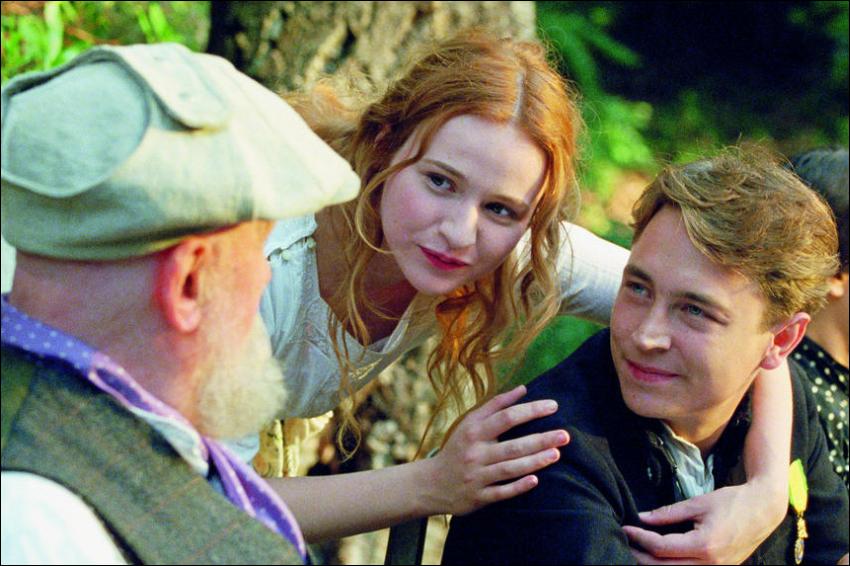Renoir
Photo from theguardian.com
Gilles Bourdos, director and co-writer with Jerome Tonnerre & Michel Spinosa
Starring: Michel Bouquet (Pierre-Auguste Renoir), Christa Theret (Andrée Heuschling), Vincent Rottiers (Jean Renoir), Thomas Doret (Coco Renoir)
The buzz
The film, which premiered at the 2012 Cannes film festival, is inspired by the true story of Andrée Heuschling. She was the Impressionist painter Pierre-Auguste Renoir’s last muse—and the first muse of his son Jean, who married her and made her the lead in all of his early films.
The film stars the grand old actor Michel Bouquet, who has previously played Rembrandt, Leopold Mozart and Inspector Javert in a 1980s version of Les Miserables.
Critics and the public in France responded to the film’s premise and rather ancient leading man.
The genres
Artist bio-pic; romance; historical drama
The premise
It’s 1915 in the South of France. The world is at war but the great artist Pierre-Auguste Renoir is living in his beautiful country estate, still painting despite painful arthritis and the recent death of his wife. Andrée Heuschling arrives as his wife’s last present—a young model whom she spotted months before her demise.
Renoir is energized by Andrée; he is soon painting with renewed passion. Renoir’s household, mainly consisting of ex-models, who now cook and clean for him, and his youngest son Coco take much longer to like her. In many ways, Andrée is a difficult person; she’s willful and high strung.
Renoir’s two older sons, Pierre and Jean are fighting for France as the tale begins. Soon, Jean arrives, having been given time off to recover from a harsh war injury that could have cost him his leg. After much sparring, Jean and Andrée fall in love. But all is not perfect for them. Jean feels a responsibility to return to the Front while Pierre-Auguste and Andrée want him to stay. In the end, Jean departs but the film’s end credits reveal that Andrée will adopt the stage name Catherine Hessling and become an actor—and Renoir’s first wife.
The performances
Christa Theret is fine as Andrée; you get her passion and insistence on being treated as a real person, not just a model. Naturally, she is physically beautiful; you can see that she was cast perfectly to be a Renoir muse.
Michel Bouquet is one of the great talents of French cinema. He’s been delivering fine performances since the 1940s. The scenes with him dealing with his arthritis are sensitively delivered. Bouquet gives us a portrait of an aging sensualist, father and artist who is desperately holding onto his life.
Vincent Rottiers is certainly acceptable as the young Jean Renoir. In part, the film lets him down; there’s none of the jolliness and artistic insight that one sees in Renoir’s masterpieces from the ‘30s. For those of us who have seen Jean Renoir as Octave in Rules of the Game (1939), this version of young director-to-be feels inadequate.
The creative team
There’s much to admire in this film. The marvelous countryside of the Cote d’Azur is beautifully evoked and the scenes of Renoir painting, inspired by his young model are well handled. There’s a good sense of how the Renoir household operated. One sees Renoir’s strengths and weaknesses: he’s a great artist attempting to be a great man—and often failing as a father, particularly to young Coco, who is allowed to run wild on the estate.
What the film’s creative team didn’t get is the essence of Renoir, pere et fils.
The skinny
This film lacks is passion, which is truly ironic, given the nature of Pierre-Auguste’s work. It also lacks humour, which along with passion, mark the greatest works of Jean Renoir.
True, that’s a high standard but the film invites the comparison. Renoir has many beautiful moments but it feels hermetic, an exercise in recreating history, not a genuinely engaging film.
It does recount the story of Andrée Heuschling—and that, certainly, is worth telling. Renoir is a worthy film, but it lacks brilliance. You won’t feel badly if you see in a cinema—but you could also wait and see it on DVD or specialty TV.












